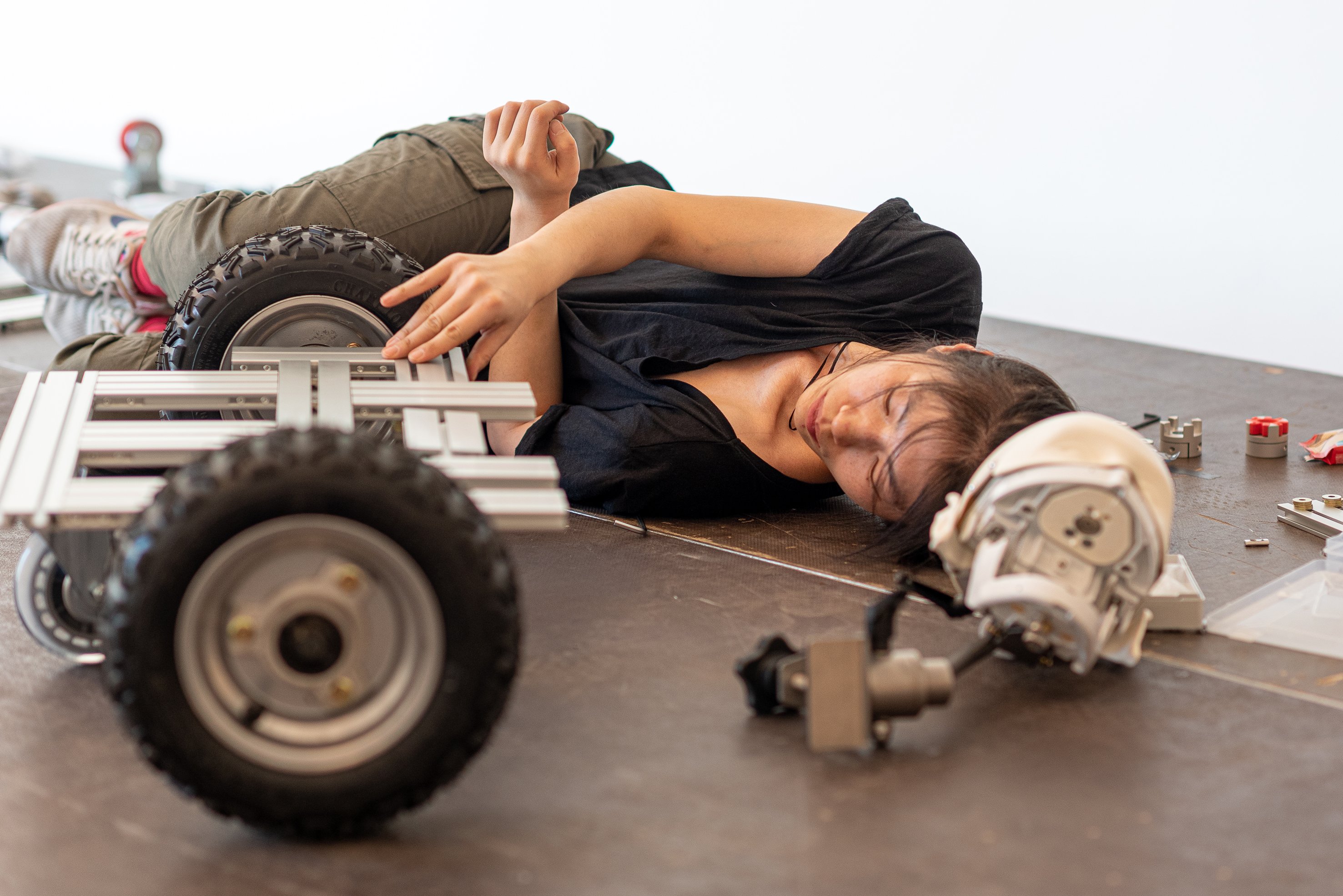
Geumhyung Jeong is gently tinkering with a robot. From the nose up, it has a human head; there’s a wheel where the jawline should be.
The South Korean artist and choreographer, who traveled to Berlin to install her solo exhibition at Galerie Klemm’s for Gallery Weekend, radiates confidence as she tools with the fragile machine. She’s entirely self-taught in robotics—wires and batteries are to the Seoul-based artist what paint might be to a painter.
While the most headline-generating art made from robots is often big budget works, like Jordan Wolfson, Jeong draws on her background as a choreographer to develop and deploy them in a tender, elegant way. In her enchanting performances and videos, she is often at the center of her mechanical offspring, steering them via remote control.
Questions around artificial intelligence, robotics, and the strange dance of agency that exists between people and machines have been accelerated in a year largely lived behind screens, not to mention against the background of heightened concerns about A.I. surveillance. But Jeong’s creations generate a surprising empathy.
Geumyhung Jeong, video still from Under Maintenance (2021). Courtesy Galerie Klemm’s.
Born in Seoul, South Korea, 41-year-old Jeong studied drama and dance before becoming a full-time artist. Programming and choreography might seem like an unlikely pairing, but both involve orchestrating individual steps to produce a whole.
For “Under Maintenance,” her latest show at Galerie Klemm’s in Berlin (through June 19), Jeong has transformed the entire space into a kind of robot operating room. One robot is designed with the sole purpose of licking the floor; another, to tilt its head up and down to mimic the viewer. They are arranged around the perimeter of the room, creating a sort of panopticon with Jeong at the center, a master puppeteer presiding over the piles of tools, cables, and terminals.
“Everyone would say something different about what a robot is,” Jeong told Artnet News in an interview. “I was quite shy at first when my work was introduced as robots. I just thought that I would like to make a remote-controlled vehicle with human-shaped parts like the head or limbs.”
Geumhyung Jeong, “Homemade RC Toy,” installation view, Kunsthalle Basel, 2019. Photo: Philipp Hänger.
It’s tempting to view Jeong’s work through the lens of her future-forward nation. Just last month, South Korea’s labor minister told citizens to “learn to work with robots,” adding that these new entries into the workforce would be important to economic recovery. But Jeong shrugs off a question about how her home country may have influenced her thinking. Automation, indeed, is a global phenomenon.
In a series of films that play on loop around the gallery space, Jeong constructs, deconstructs, and tests her cast. The room is quiet save for the percussive melody of clicks, the grind of an occasional screw, and the low whirr of a motor.
Jeong’s work is the opposite of slick. Her robots’ disarmingly simple innards are laid bare right there on the table. In an era when machines are growing in power, hers are endearingly vulnerable—almost loveable.
Geumhyung Jeong’s “Under Maintenance” (2021). Exhibition view. Photo: Maja Renn. Klemm’s, Berlin. Courtesy by the artist and Klemm’s, Berlin
“Sometimes, a machine will struggle to make a motion and it will start shaking or shuddering,” she said. “That is the moment when it seems the most real to me. It looks even more alive when it is not working.”
In recent performances, like at Kunsthalle Basel in 2019 or at Palazzina dei Giardini in Modena, Italy, last year, Jeong attached prosthetic arms and legs to the robots’ cores; they crawled slowly around a dance floor. In Basel, Jeong crawled with them, naked, directing them with a remote. Sometimes, she used her mouth to touch the knobs.
In these performances, her body becomes yet another a tool to give these objects life. “I see us as being in character together,” she said.
At Klemm’s, she is tweaking her robots in real time, working carefully to refine their motor skills. “I started taking courses to understand programming and electronic circuits,” she said. “I learn more from searching which materials I should buy and finding a way to put them together in order to build the machine’s body as I imagined. I am constantly trying to add new parts without knowing if it would work.”
The bond between Jeong and her robots is something like a relationship—a practice involving care, commitment, and communication. But she is careful not to over-romanticize it, or to suggest the potential for some kind of utopian human-robot union.
“There is a codependency, but in the end, machines do not need us,” she said. “We need them.”